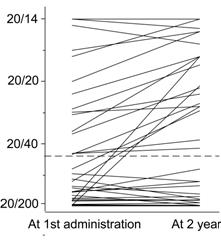Background/Purpose: Infliximab, a chimeric monoclonal antibody against TNF-a, is expected to improve prognosis of visual function in patients with severe and refractory uveitis of Behçet’s disease. However, prognostic factors remain to be determined.
Methods: Observational study in one institute was conducted in the cohort of patients with Behçet’s disease treated with infliximab. Outcome was defined as failure to recover above 20/50 of visual acuity (VA) at 2 year after the first administration of infliximab. Associations between outcome and baseline characteristics were assessed by bivariable analysis and logistic regression analysis to adjust confounding factors. Significance of each factor was assessed by likelihood ratio test.
Results: Infliximab was initiated in 28 patients between February 2007 and May 2012. Nineteen patients continued to receive infliximab beyond 2 year and could be assessed. Among 38 eyes of 19 patients, 18 eyes could not achieve 20/50 of VA (Figure). Bivariable analysis between the outcome and baseline characteristics demonstrated p-value (p) = 0.53 for sex, p = 0.19 for disease duration, p = 0.43 for HLA-B51, p = 0.97 for C-reactive protein (CRP), p < 0.0001 for VA at the first administration, p = 0.088 for deviation of VA during 6 months before the first administration, p = 0.48 for concomitant use of corticosteroids and p= 0.042 for concomitant use of immunosuppressants such as cyclosporine or methotrexate. Adjusted analysis with confounding factors such as sex, age, disease duration, VA at the first administration and concomitant use of immunosuppressants by logistic regression analysis revealed disease duration (p=0.024) and visual acuity (p < 0.0001) as significant factors (Table). Receiver operating characteristic (ROC) analysis demonstrated 16.5 months of disease duration and 20/140 of visual acuity (Area under the curve: 0.95) for candidate cutoff values.
Conclusion: Disease duration and VA at the first administration of infliximab were the most contributable factors for the prognosis of visual function after 2 years. Cutoff values, 16.5 months of disease duration and 20/140 of VA suggest the importance of ‘windows of opportunity’ in treatment for uveitis of Behçet’s disease.
Figure. Change of visual acuity
Visual acuity
 Table. Contributable factors for visual acuity at 2 year
Table. Contributable factors for visual acuity at 2 year
Factor p-value
Sex 0.41
Age 0.42
Disease duration 0.024
Visual acuity <0.0001
Immunosuppressants 0.64
*regression logistic analysis and likelihood ratio test
Disclosure:
A. Nakabayashi,
None;
T. Hirano,
None;
Y. Hishitani,
None;
K. Hagihara,
None;
K. Nakai,
None;
K. Nishida,
None;
A. Kumanogoh,
None.
« Back to 2013 ACR/ARHP Annual Meeting
ACR Meeting Abstracts - https://acrabstracts.org/abstract/prognostic-factors-of-visual-function-in-the-treatment-with-infliximab-for-uveitis-of-behcets-disease/
